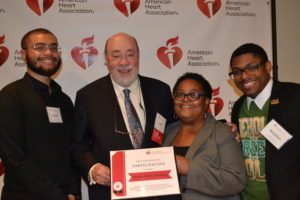The American Heart Association’s Social Impact Fund Seeks Donors to Expand to the Greater Washington Region
The American Heart Association, the world’s leading nonprofit organization focused on

heart and brain health for all, seeks to explore new investment opportunities in the Greater Washington Region around organizations committed to breaking down social and economic barriers that prevent people from living healthy lives. Through its Social Impact Fund, the focus areas for investment include food and housing insecurity, access to health care and income equality. The Social Impact Fund will make investments into under-resourced communities – many being the hardest hit by COVID-19.
Populations in under-resourced communities are more likely to have underlying health conditions (like high blood pressure, diabetes, heart disease and obesity), are more likely to work unstable or frontline jobs limiting their ability to socially distance themselves and are less likely to have access to quality healthcare. For example, Prince George’s and Montgomery Counties, Maryland have suffered from the highest rate of infection of COVID-19 in Maryland, widely attributed to an abundance of frontline workers and underlying chronic health conditions. In the District of Columbia’s Wards 7 and 8, conditions like uncontrolled blood pressure, diabetes and obesity are in disproportionate numbers compared to the rest of the country. Differences in COVID-19 complications by race/ethnicity seem to be emerging and are an opportunity to address longstanding health inequities and increased burden on those with the greatest need.
As a result of a generous seed donation, the Association is actively seeking additional funders to bring the Social Impact Fund to the Greater Washington Region.
“Demand for organizations that could be supported through the Social Impact Fund has grown exponentially within fragile communities throughout the DC region,” said American Heart Association volunteer and Social Impact Fund supporter, John Houston III. “It is my hope that others will join us in the launch of this fund so that we can make real change for people particularly in those areas devastated by COVID-19.”
While significant advances have been made in cardiovascular disease prevention and treatment, health results are disparate across economic, racial and ethnic groups. According to the County Health Rankings, only 20% of a person’s overall health is determined by clinical medical care, while the rest is determined by social and economic factors, as well as physical environment. Approximately 50 million people in the United States are at higher risk for cardiovascular disease because they lack the most basic needs — healthy food, clean air and drinking water, quality education, employment and housing.[1]
The Social Impact Fund is currently operating in Chicago, Boston, New York, San Francisco, Oakland and Flint, Michigan. To expand investment capital and scale the AHA Social Impact Fund’s innovative approach to addressing the health disparities exacerbated by COVID-19 in the Greater Washington Region, contact Yvette Mingo at Yvette.mingo@heart.org.
About the American Heart Association
The American Heart Association is a relentless force for a world of longer, healthier lives. We are dedicated to ensuring equitable health in all communities. Through collaboration with numerous organizations, and powered by millions of volunteers, we fund innovative research, advocate for the public’s health and share lifesaving resources. The Dallas-based organization has been a leading source of health information for nearly a century. Connect with us on heart.org, Facebook, Twitter or by calling 1-800-AHA-USA1.


